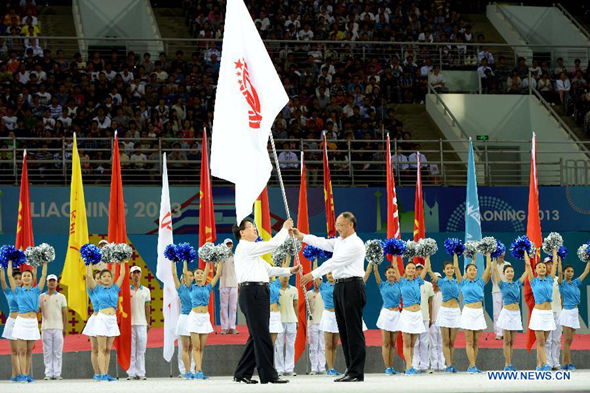Liaoning brings curtain down on National Games
 0 Comment(s)
0 Comment(s) Print
Print E-mail Xinhua, September 12, 2013
E-mail Xinhua, September 12, 2013
|
|
|
Liu Peng (R), president of Chinese Olympic Committee and head of China's State General Administration of Sports gives the flag of national games of China to Tianjin mayor Huang Xingguo during the closing ceremony of the 12th Chinese National Games in Shenyang, northeast China's Liaoning Province, Sep 12, 2013. Tianjin will host the 13th National Game in 2017. (Xinhua/Li Gang) |
The 12th Chinese National Games lowered curtain on Thursday afternoon with the principle of frugality passed on to organizers of future Chinese sports events.
Chinese Premier Li Keqiang officially declared the Games close in a low-budget closing ceremony held at the gymnasium in the Olympic Sports Center.
Shandong beat Liaoning to top the final medal tally with 65 gold medals, breaking a 20-year tradition that hosts had been winning.
Liaoning was second with 56 golds with Guangdong in third place with 50.5.
With 78 percent of the budget slashed to keep it to a maximum of 800 million yuan (about 130 million U.S. dollars), the Games featured a smooth running and high-level competitions which saw five Asian records, 14 national records and one national youth record renewed.
Hailed as China's mini-Olympics, the Games attracted 9,770 athletes from 38 participating delegations including Hong Kong and Macao special administrative regions, the People's Liberation Army, the Xinjiang Production and Construction Corps and various sports associations of the trades such as railways, coal mining, forestry, finance, banking and aviation.
The quadrennial games that featured all the 28 Olympic sports, plus baseball, softball and Wushu, used a complex medal counting system, which awarded two golds to the winner of an Olympic gold, one to a world record set in the Olympics and three apiece to the winners of soccer, volleyball and basketball.
Olympic swimming champion Sun Yang stole the limelight by sweeping 10 golds. The 21-year-old had secured five National Games golds without breaking a sweat, thanks to his two-gold, one-world-record performance in London.
Sun went on to collect another five in the men's 200m, 400m and 1,500m freestyle and two team events. He also grabbed a bronze in the men's 100m freestyle to become the most-medaled athlete.
These Games were not without ugly scenes. The Beijing team threw the women's rugby final against Shandong in a protest to controversial refereeing, while twin synchronized swimmers Jiang Wenwen and Jiang Tingting from Sichuan furiously questioned their scores which they believed could be lowered on purpose in favor of the local swimmers.
"There are a lot of good results achieved at the Games," said Xiao Tian, vice director of the State General Administration of Sports. "New records were set in athletics, swimming, weightlifting and cycling and some of the results could have ranked among top three in the World Championships this year."
Guangdong's weightlifter Li Yajun in the women's 53kg class heaved 105kg to surpass the world snatch record of 103kg, although the International Weightlifting Federation does not sanction world marks set at the National Games.
Next National Games will be held in the north Chinese city of Tianjin.







Go to Forum >>0 Comment(s)